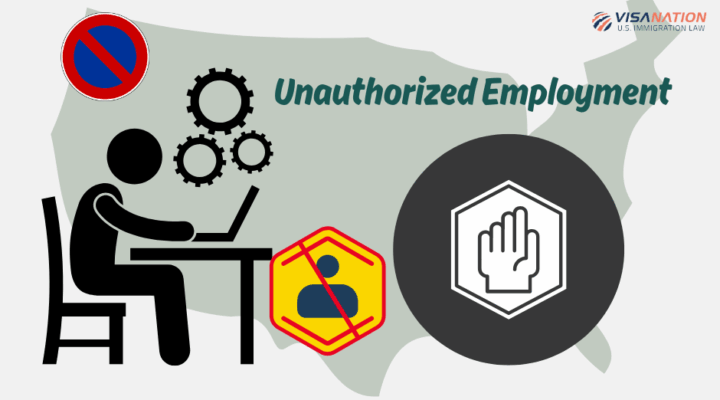Many people ask whether it’s possible to work in any form while waiting for their green card. The key takeaway is that working in the U.S. without proper work authorization is a serious violation of immigration law that can jeopardize your green card status. For a foreign national pursuing a green card, unlawful employment can lead to severe penalties, including deportation and permanent bars to enter the U.S.
According to the United States Citizenship and Immigration Services (USCIS), unauthorized employment is any labor or service performed for an employer within the U.S. by a foreign national who is not authorized to accept employment.
It also involves working beyond the period or scope of one’s employment authorization. While this may look simple on paper, what constitutes lawful work in the U.S. is more than working for an employer. Several other actions could be deemed unauthorized employment.
If you have questions about your employment authorization, speak to one of our attorneys!
Without a clear understanding of the law, you could unwittingly violate your immigration status. USCIS works to ensure that the workers in this country are abiding by the law. For this reason, it is essential to seek guidance whenever making an employment decision. You may be engaging in unauthorized work by participating in any of the following:
Working Without Authorization
Working for a company or an individual without proper work authorization is deemed illegal employment. When applying for a green card through adjustment of status, it is possible to apply for a work permit, known as an EAD, using Form I-765. Furthermore, you can continue to work until your green card is approved if your non-immigrant visa allows for it, such as an O-1, H-1B, or J-1.
To ignore these rules, both you and your employer will face penalties if caught. This violation is not taken lightly by law enforcement agencies, and it carries significant consequences for both the employee and the employer. For all the time it takes to apply and receive a green card, the risk is not worth the punishment.
Additionally, playing an active role in the creation of a company may be deemed unlawful if you don’t have proper authorization to do so.
Unauthorized Self-Employment and Freelancing
If you establish or run a business in the United States without the required approval, even if you do it on a part-time basis, it will be considered unauthorized employment. It is important that you apply for the proper employment authorization documents before becoming self-employed.
Furthermore, remote freelancing could be deemed a home business even if it is done on the internet. If your status does not allow employment in the United States, you may be violating immigration law.
Volunteering
You do not need a work permit to volunteer in the U.S. However, there are rules concerning volunteering in the country. Volunteering means donating your time to an organization primarily set up to provide charitable or humanitarian deeds without any form of compensation or remuneration.
Furthermore, to protect the jobs of United States citizens and guard against the exploitation of workers, volunteering is generally not allowed in a position that should be filled by a paid worker.
For example: It may be considered an unfair arrangement to work for free in a position that is performed by a paid person, even if it is solely to gain experience. This is because your free service may be denying someone paid work.
Passive Investment Is Allowed
Foreign nationals are allowed to make financial investments to generate capital gain without a work permit. Investment in the stock market, bonds, or other forms of savings that bring returns is permitted with an E-2 investor visa. You can also invest in a private company as a passive investor. However, playing an active role in the day-to-day running of a business or active Forex trading or day-trading could be considered unauthorized employment. Therefore, any sort of active management in the U.S. is illegal.
Wettashinghe vs. USCIS
A student was found to have violated his status for investing in and being actively involved in running a business. Wettasinghe bought a fleet of six ice cream trucks and leased them to people for the purpose of selling ice cream on the streets. His active involvement included the regular buying of ice cream and stocking the trucks, plus occasionally driving the trucks when a driver was not available. The court ruled that his activities were akin to unauthorized employment and affirmed his deportation or voluntary departure order.This case serves as a cautionary tale for international students and other visa holders who might be considering business investments or entrepreneurial activities while in a host country. It underscores the importance of understanding the limitations and legal obligations tied to one’s immigration status. Any sort of business activities might lead to severe consequences like deportation or voluntary departure orders, depending on the laws of the host country.
How Can USCIS Track Illegal Work?
One of the most frequently asked questions about U.S. labor law is how the USCIS can track illegal work if someone engages in unlawful employment. In this age of evolving technology and artificial intelligence, it has become unrealistic to assume you can avoid getting caught working without authorization.
With the integration of technology, information sharing, and a more vigilant approach, the chances of detecting illegal employment have dramatically increased, reinforcing the importance of adhering to all legal employment requirements.
The U.S. government has the means to discover instances of unlawful employment. Your social media is not private, and the U.S. government can flag instances of posts that would hint that you are working illegally in the U.S. The USCIS often engages in targeted investigations, particularly in industries known for higher instances of unauthorized work. Here are some of the ways the USCIS will know if you are engaged in unauthorized employment:
Tax Records
If the unlawful job involves filing a tax document like a Form 1099, the USCIS may find out through your income tax return. While this is the jurisdiction of the IRS, the USCIS can simply request the information from them. This is one of the most common ways the USCIS will know if you are engaged in unauthorized employment.
Social Media & The Internet
Almost every activity is being shared online, with just a simple search about you or your employer, the USCIS can have access to evidence confirming unauthorized work. Even if you don’t share such information on the internet, you never know when a colleague or other person might share a group picture of you at work on LinkedIn, Facebook, Twitter, Instagram, or TikTok.
Someone Might Report You
Even when the employment is under-the-table work within your neighborhood, someone might suspect and report you. If it is in an organization with multiple employees, you might also be reported by a coworker. The USCIS takes these reports seriously, and it may lead to further, more extensive investigation by the organization.
If you are unsure of your current employment authorization standing, let’s talk!
If your I-485 form was denied due to unauthorized employment, you should contact an immigration attorney immediately. Our team can help you strategize ways to appeal the denial and gather evidence in your favor that you were authorized to work.
The government’s immigration authorities have the discretion to deny green card or immigration visa applications for various reasons, including security, health, criminal, or dependency concerns, and evidence of unauthorized employment. However, some exceptions exist for certain groups, like immediate relatives of U.S. citizens and some employment applicants under INA 245 (k). If your green card application is rejected based on these grounds, you may request reconsideration by filing Form I-290B, which is the Notice of Appeal or Motion.
Alternatively, you have several other options for appealing the decision. If you received a denial notice after filing Form I-765, you can seek reconsideration by submitting Form I-290B. However, please note that there is a filing fee associated with this process.

Engaging in authorized employment under an F-1 student visa or as a dependent visa can result in losing your visa.
F1 Visa Unauthorized Employment Consequences
Based on the laws surrounding the F-1 visa, you cannot work off-campus, but you can accept on-campus work. Unauthorized employment under F-1 is illegal and can result in you losing your SEVIS record.
But what if you have a great business idea? You can take steps to lay the framework of the business, and then, after graduation, you can get OPT work authorization to follow through on it.
Dependent Visas
There are some exceptions for dependent visas on who can work.
- F-2 dependents, which include children and spouses of F-1 holders, cannot work under any circumstances.
- O-3 dependents are not authorized to work.
- J-2 dependents may work by applying for a work permit, filing the I-765 form.
- H-4 dependents may work if the H-1B spouse has an approved I-140 or an extended H-1B visa beyond the six years.
There are some serious consequences of unauthorized employment for the employee, which include:
Deportation
Removal proceedings could be initiated against you if you have been found to have violated your status by engaging in unauthorized employment. If you are found guilty, you will likely be deported to your home country.
Ineligibility to Extend or Change Status
If you are on a work or student visa and are considering changing or extending your status, engaging in unlawful work may jeopardize that goal. According to immigration law, a foreign national must abide by the terms of his status, one of which is compliance with labor laws. Violating this makes you ineligible to change or adjust your status.
Inadmissibility Grounds for Future Entry
Engaging in unauthorized employment could lead to the cancellation of your visa. Especially if you want to reapply in the future, this record will stay and pop up during background checks.
If you have concerns or confusion whether the work you are doing violates immigration law, contact us.
Ineligibility for Status Adjustment
Unauthorized employment places a bar on your status adjustment. It doesn’t matter if the time of the unlawful work is before or after filing the adjustment of status petition, you will be considered ineligible to become a green card holder. For example, during your status adjustment procedures, you will be asked to indicate whether or not you have engaged in unauthorized employment in the U.S. Unless you willingly decide to lie, you will have to admit it. Keep in mind that lying in your petition could be deemed falsification, which is another serious offense.

What If I Need to Work and I Don’t Have an Authorization?
Everyone needs to earn an income to meet everyday needs. However, for legal purposes, this is not an excuse to engage in what is considered a violation of your status. If you are in the United States on a work visa, it is believed that everything about employment must have been taken care of right from the onset of your visa application. You, therefore, need to stick to the scope and period of employment allowed by your status.
If you are on a student visa, there are several legitimate ways to earn an income by doing either on-campus or off-campus work. Just ensure you get proper documentation from the appropriate source. Also, some people on visitor visas attempt to work in the United States, which is an outright violation of their status and should not be considered at all. If you are on a visitor visa and you must work, the right thing is to apply for an employment-based visa. You can also opt for a student visa, which will allow you to study and work on a part-time basis for a limited number of hours per week. However, you must not assume that you have the right to start working until your application has been approved by the USCIS.
Can I work for a foreign-based company while in the U.S.?
No, according to U.S. immigration laws, even if they are paying you through a foreign bank account, it is still seen as employment.
How to Obtain Work Authorization
The general work permit in the United States is known as the Employment Authorization Document (EAD). This enables you to lawfully work in the United States for a specific period. If you are not a U.S. citizen or lawful permanent resident, you will need to obtain an EAD to work in the U.S.
Eligibility for EAD
Eligibility for an EAD varies depending on an individual’s immigration status and specific situation. The EAD application can be filed by foreign nationals under the following statuses:
- Nonimmigrant work visas
- Students and exchange visitors
- Asylee and asylum seekers
- Foreign nationals with a pending green card application
- Fiancés and spouses of United States citizens
Employment Authorization Document Application Process
To request an Employment Authorization Document, you will need to file an I-765 form. This same form is used for renewing or replacing an expired or lost EAD. Your application must be submitted alongside the following supporting documents (as applicable to each applicant):
- A copy of your Nonimmigrant Arrival-Departure Record, I-94 (front and back).
- Your passport or other travel documents
- A copy of your last EAD, if you have been issued one
- Your G-28 form, if an accredited representative or attorney is representing you
- A copy of any government-issued identity
- The final note of eligibility, resettlement, and your I-797 form (for refugee applicants)
Penalty for Working on a Tourist Visa USA
You should not violate the terms of your tourist visa, which explicitly forbid working. See the section above titled ‘Consequences of Unauthorized Employment’ for an overview of possible penalties you may incur. The best course of action is to apply for a work visa if you have a desire to work in the United States.
VisaNation knows how to handle the legal proceedings for anyone looking to secure legal employment-based immigration in the U.S.
Permissible Activities on B2 Visa
- Tourism or social visits to friends/family
- Medical reasons
- Engaging in social activities
- Amateur athletes or entertainers
- Dependents of crewmen or armed forces
Can a B-2 visa holder apply for a work permit?
No, as the B2 is a visitor visa, they cannot apply for a work permit. They must apply for employment authorization separately.
While there have been very select cases where unauthorized employment has been overlooked, it should not be mistaken as a lenient stance by the officials. Engaging in unauthorized work is a serious violation of U.S. immigration law, and authorities take this unlawful conduct seriously.
Even in cases where forgiveness has been granted, it often involves intricate legal arguments and exceptional circumstances. Assuming that unauthorized employment may be forgiven is a risky gamble that can jeopardize one’s status in the U.S. The consequences can be as severe as deportation orders, reflecting the uncompromising attitude toward maintaining the integrity of the nation’s labor laws.
Can My Spouse Get Employment Authorization?
Yes, spouses of foreign nationals may obtain work authorization and work in the U.S. Most U.S. visa classifications have derivative visas for the immediate relatives of the principal beneficiary. For instance, if you are on an H-1B visa, your spouse can apply for and obtain an H-4 visa.
For the exchange visitor category, spouses and dependents of a J-1 student can also get J-2 visas. The J-2 files the Application for Employment Authorization (I-765) with the applicable Service Center, along with documentation demonstrating that the employment is not required to support the J-1 visa holder.
These derivative visas allow the holders to apply for and obtain employment authorization by following the same procedures above. While the process might take some time, it is worth the wait considering the severe penalties that unauthorized employment carries. Therefore, there are many ways to avoid engaging in unlawful employment.











